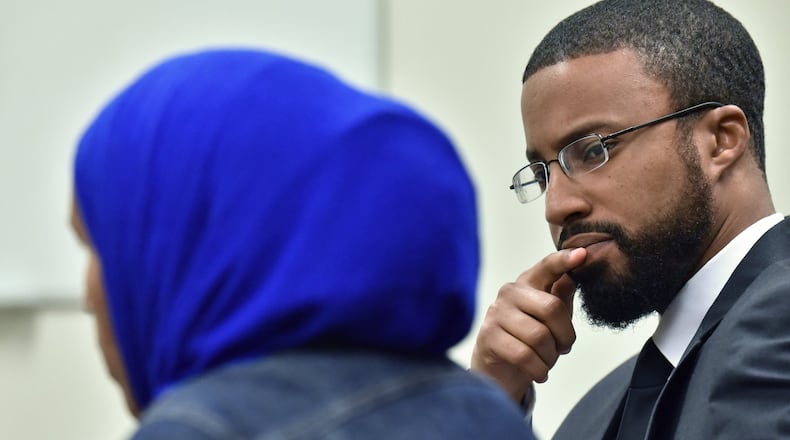One year after her mentally ill sister was shot repeatedly by police in a Johns Creek subdivision, Aisha Hussein is still trying to piece together how a plea for help led to her younger sibling’s death.
Investigators from the Fulton County District Attorney’s Office are also seeking answers. That effort may be handicapped by the refusal of two of the police officers to speak to DA investigators.
Johns Creek police spokesman Chris Byers said the department does not compel its officers to do so, requiring only that they agree to interviews with Internal Affairs.
RELATED:
Who was Shukri Ali Said? How did she end up dead at hands of police?
Johns Creek police shooting causes some to question calling 911
Still, it’s a surprising decision. In his six years in office, former DeKalb County District Attorney Robert James investigated numerous officers for possible excessive force and “I don’t recall anyone refusing to be interviewed,” he told The Atlanta Journal-Constitution Tuesday.
The officers’ refusal came with no apparent consequence. Byers said each of the officers involved — Derrick Wilson, Ken Kennebrew, Phil Nguyen and Richard Gray — have been returned to full duty, cleared of any wrongdoing in Said’s death, at least by Internal Affairs. Edward Mitchell, one of Hussein’s lawyers, said they were told by investigators about the two officers declining to cooperate.
The office of Fulton County District Attorney Paul Howard declined to comment citing an ongoing investigation. It's too soon to know if he will bring criminal charges. A decision is likely one year away, at least.
Hussein had called 911 on the morning of April 28 out of concern for her sister’s safety, unable to calm her. Thirty six-year-old Shukri Ali Said, a Somali-born American citizen and Muslim who suffered from bipolar disorder, was found wandering the streets of the affluent Sugar Mills community holding a passport and a knife. Within 15 minutes of that call she’d be dead, hit in the neck, head and chest by five bullets after refusing commands from officers to stop walking.
But why did only two of the four officers who confronted Said discharge their weapons? Was the perceived threat she posed to the public’s safety credible, or was Said another in a long line of mentally ill victims killed because she disobeyed commands that, in the moment, she likely didn’t comprehend? The GBI has completed its investigation, forwarding the findings to Howard’s office.
Hussein said she will continue to make the argument that Johns Creek police should be held accountable for her sister’s death. The case has attracted national attention, with many believing, as Hussein does, that had Said been a white housewife with a knife, police would not have fired.
“She is clearly of African descent, she’s wearing Abayba, Islamic attire, she’s fully covered, and she is irrational, saying ‘I’ve got to go home. I’ve got to go home,’ ” Hussein said. “I feel like … if her Islamic identity wasn’t so dominant, it might have been handled differently. Race and religion clearly played a big part in it.”
Said was shot in two different intervals. Three bullets hit her the first time. Then, after getting up, she was shot twice more.
“For us it’s an important question because we’re already upset at how it escalated in the beginning but we’re especially curious how a 5-foot-4 woman,who had been shot three times, was such a physical threat she had to be shot two more times,” Mitchell said.
Then there’s her sister’s mental illness and the role it played in Said’s death. Her case mirrors another highly publicized police shooting that eventually led to murder charges against a former DeKalb County cop. Officer Robert “Chip” Olsen, responding to 911 calls about a naked man strolling the premises of a Chamblee apartment complex, said the man ran towards him, ignoring commands to stop. Olsen fired two bullets, killing Afghanistan War veteran Anthony Hill, who was unarmed. Olsen’s oft-delayed trial is scheduled to begin in September.
In both cases, there were no attempts at de-escalation, which police trainers stress as crucial when dealing with mentally ill civilians. Police advocates counter that wasn’t possible, as public safety, or the safety of the officers, was at risk in both situations.
The two officers who shot Said had been sufficiently trained, Byers told the AJC last year. One is a certified negotiator and crisis intervention officer with over 300 hours of training in those disciplines.The other attended de-escalation tactics in 2017. Both attended a “Guide to the Muslim Community” class the department sponsored in 2016.
Hussein, who the GBI allowed to watch dash cam footage of the shooting, said when officers first approached Said, she was walking alone and away from them. When she refused to stop, they first fired a bean bag, then a Taser, but Said continued moving away.
At one point, she shouted “Allahu Akbar,” Arabic for “God is greater.”
Boxed in with police cars, Said refused to comply. Hussein said she was first shot after raising one of her arms in the direction of the officers.
“She goes down, silent. Then she gets up,” Hussein said. The additional shots are off-camera.
Moving on from the shooting has been difficult for Said’s relatives. Said had lived with her family for most of her adult life and had moved with them to Sugar Mills five months ago.
“I don’t feel like we can be happy there,” Hussein said. “Our life plan didn’t include my sister being shot in a subdivision. When we picked that particular neighborhood and that particular house it was for all of us.”
About the Author
The Latest
Featured



